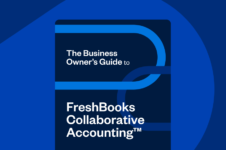Get tips on staying motivated, focused, and productive during the busy season from FreshBooks Accounting Partners.

When you’re an accounting professional with a can-do customer service ethos, it’s hard to cut off a client when they call with a “quick question”. (Spoiler: It’s never a quick question.)
The truth is, you want your clients to be curious about their business finances and make use of the valuable insights you are uniquely positioned to provide. This allows them to make better business decisions instead of only thinking about their accounting at tax time.
But when you’re answering ad hoc questions without boundaries (or billable hours), there’s a good chance you’ll find yourself overworked, overwhelmed, and underappreciated. Your guidance won’t have the same impact if your clients only seek it out around tax time or during a crisis.
This is why you should charge for the advisory services that empower your clients to take their business to the next level.
Table of Contents
What Are Accounting Advisory Services?
In a nutshell, advisory services are higher level (and higher value) than more compliance-based tasks like generating financial reports, filing taxes, and doing bank reconciliations. Compliance services can be completed by anyone with the right accounting training.
In contrast, accounting advisory services require the expert touch of an accounting professional who is innovative, forward-thinking, and eager to deepen client relationships. Advisory accounting provides proactive and predictive findings about a client’s business. It considers their business goals, patterns, and financials to provide tailored insights that allow them to take constructive next steps and avoid pitfalls. It’s like being a partner to your clients, not an annual service provider.
Bonus: When you focus on advisory services, you’re more likely to attract higher-value clients. They recognize the importance of a partnership with their accounting professional and are willing to invest in it.
Identify the Advisory Services You Should Charge For
Here are some examples of advisory services that you could charge by the hour to conduct—or that could be part of an overall partnership package:
- Interpreting profit & loss: variance, comparative analysis
- Internal changes/decisions like staffing or opening a new service line
- Applying for loans for expansion, lines of credit
- Cash flow issues and how to resolve them
- Operations reviews
- KPIs and metrics
- Tax planning
- HR, payroll and employee benefits
- Technology training
- Improving workflows
- Acquisition or mergers
Why You Should Sell Value, Not Time
No discussion about advisory services is complete without considering how to charge for them. Some accounting professionals have an hourly rate and bill accordingly. While that works for many, if you’re considering a focus on advisory services and reducing compliance tasks, you should weigh the benefits of value-based pricing.
Like advisory services, it focuses on the value you bring to your clients, not the tasks or time it takes to complete them. Rather than commodifying your time, you and your clients can take a holistic view of what they want to achieve and how you can contribute to their business goals. Then, you can outline all of the services you will provide over a quarter or a year and offer a flat-rate price.
This approach allows you to set expectations around how often you’ll meet and create boundaries so that you’re not overwhelmed with spontaneous phone calls or emails. It also gives you breathing room to apply your finely-honed accounting skills to bigger- picture issues rather than the minutiae associated with compliance tasks.
Make Advisory Efficient: Work in the Same Platform as Your Clients
If you’re freeing yourself of the busy work of accounting, who will take on some of those low-skill tasks? Ideally, your clients.
There’s no reason a business owner or a team member can’t take on simple pre-accounting work like invoicing, filing expenses properly, and doing bank reconciliations. This gives them more day-to-day insight into their financials, which means they’ll come to your conversations more tuned in to reality.
Here at FreshBooks, we’ve developed a framework that facilitates this co-operation between client and accountant: Collaborative Accounting™. A model designed for accounting professionals who want to focus on advisory services and sustainably grow their business. Your clients can have more “skin in the game” when it comes to their financials, and you can minimize the time spent fine-tuning client accounting and maximize the time guiding your clients as they grow.
Curious? Check out the FreshBooks Certification, an online, self-paced training program designed to help you align your firm’s goals, workflows, and technology behind the Collaborative Accounting strategy and platform that fosters trust and creates efficiencies. All members of the FreshBooks Accounting Partner Program have free access to this training.
Advisory Services: A New Frontier for Accounting Professionals
Embracing advisory services could mark a significant shift towards a new business model for you—or become another offering you provide to your clients. By offering tailored insights and guidance beyond traditional compliance tasks, you can position yourself as an indispensable ally in your clients’ business journeys.
Using a value-based fee mechanism for advisory services reflects your expertise and fosters a culture of mutual investment and growth.
And through collaborative platforms like FreshBooks, you can streamline your processes and empower clients to take a more active role in their financial management.
As the accounting industry continues to evolve, embracing advisory services is not just a strategic choice; it’s a commitment to shaping a more meaningful and efficient future for all accounting professionals and their clients.

Written by Heather Hudson, Freelance Contributor
Posted on April 24, 2024
 How to Build Advisory Services Into Your Accounting Firm
How to Build Advisory Services Into Your Accounting Firm 5 Ways to Work Better With Your Clients in FreshBooks, for Accountants
5 Ways to Work Better With Your Clients in FreshBooks, for Accountants Empowering Your Clients Is the Key to Meaningful Advisory Relationships
Empowering Your Clients Is the Key to Meaningful Advisory Relationships





